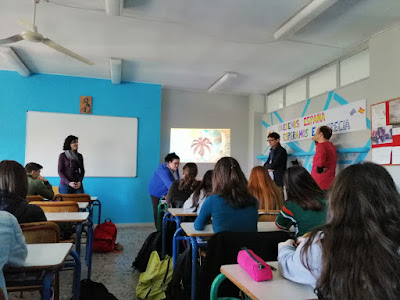§
Meeting
with the teachers in charge of discipline: methods applied to guarantee a
peaceful coexistence between both students and teachers.
§
Attendance
to a peer tutoring meeting related to incidents and the follow-up procedure.
Meeting
with the Erasmus+ Coordinator: assessment of the stay, exchange of ideas and
experiences, suggestions for future collaboration, etc.
Además, participé en una clase sobre literatura griega moderna en la que se llevó a cabo un análisis comparativo entre Joanni Ritsos y Federico García Lorca. Las profesoras Dora Glaraki, Despina y Anastasia pusieron en práctica una demostración se cómo trabajar con los alumnos la metodología "world café". Los alumnos, como se aprecia en las fotografías, divididos en grupos, se sientan en mesas dirigidos por un alumno. Mientras todos los alumnos cambian de mesa y van participando en todos los grupos, el alumno que dirige se mantiene en su sitio. Las mesas, colocasa de cuatro en cuatro, están forradas de papel, de tal manera que ese papal de tamaño de mural sirve, a su vez, para ir esribiendo sobre él las conclusiones de cada grupo que pasa. Así, cada alumno guía trata un tema y todos los alumnos van pasan por todos los temas. Al final, cada alumno guía expone los resultados de lo trabajado con todos los alumnos. Cada uno de los temas tiene un contenido relacionado con el tema a tratar: Jiannis Ritsos, García Lorca, La Guerra Civil Española, el dictador Metaxas, etc... Además, incorpora preguntas y reflexiones que propician la conversación que lidera el alumno guía. Tiene la ventaja de que todos los alumnos participan, al ser los grupos pequeños.























